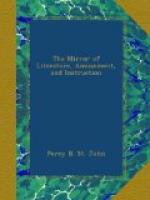“Ah!” I exclaimed, “stop there—that rock is so commonplace.”
Harry laughed and went on with his argument.—“Besides,
there is the gratification of making yourself considered
in society—which no single man is.
A single man is a kind of protected or licensed vagabond—rambling
to and fro without stamp or mark, as Witwould might
say,—like a sheep that has been overlooked
at tarring time. His home is a desert to him,—and
the love of social converse, which is so natural,
and so amiable at the same time keeps him eternally
in a state of fidgetty restlessness, which precludes
all possibility of serious and persevering labour.
Only think of the horrors of a house without a queen—Yawning
servants, negligent housekeepers, extorting tradespeople,—these
and a thousand other annoyances, for which you have
no relief, because you cannot stoop to meddle or make
in such transactions—are the agitations
which perpetually infest the domestic commonwealth
of a bachelor.—But turn your eyes into the
house of ’Benedick, the married man’—He
wears his rue with a difference, indeed!—There
is a sense of life, bustle, mirth, and happiness, in
the very air of the dwelling. To be greeted with
smiles at your going forth and coming in—to
know that there is at least one who serves you without
a self-interest—to hear the joyous, feminine
laugh, delicate and temperate in the very whirlwind
of its ecstacy, ring through the mansion from hour
to hour—to hear the little foot pattering
about you as you sit at your philosophic studies—to
have a friend with whom you can converse freely and
without fear of present offence or future disadvantage—and
whose presence is not without its influence and its
charm, even when the call of a worldly ambition summons
you to—
“——Pursue
Your tasks, in social silence
too,”
with just sense enough to understand all you can say
to her—and nothing so wise as to mortify
you at any time by setting you right. Then, instead
of the natty primness of your bachelor’s apartment,
you have your eyes feasted by that elegant confusion
of the little sanctuary—the charm of which
cannot, unseen, be apprehended, and is only known
to those who are privileged to enter, by the passport
of Hymen. A bit of bobbin here—a thread-paper
there—here a hat feather—there
a scrap of silk.—Besides,” [drawing
his chair closer to mine and looking very tender]
“when you love her, you know—.”
He paused and sighed, and I groaned strenuously.—
“And is this all you have to say in defence of an elopement with a girl of sixteen.” ["A beautiful girl,” he passionately interrupted] “well! a beautiful girl—so young, that it is perfectly impossible for you to form any judgment on her inclinations or her temper—at a time when her character is undecided—unformed—when that which is mere caprice, frequently assumes the hue of passion, and wears all its fervour and intensity. Or if it should continue unabated—as I must




